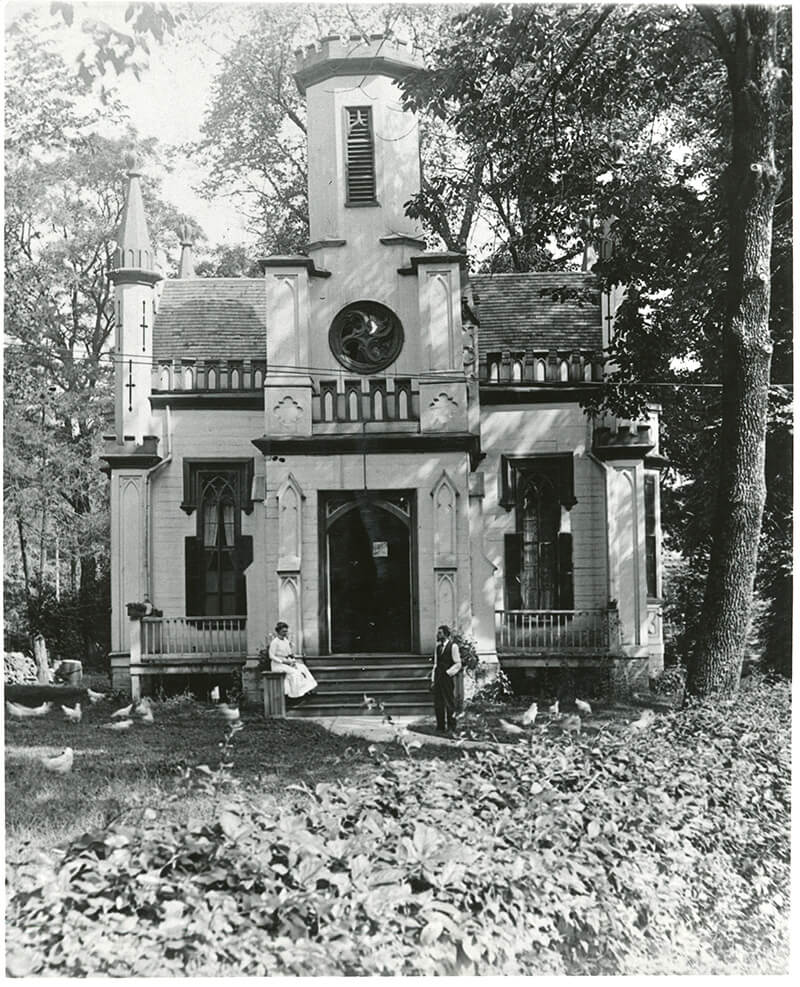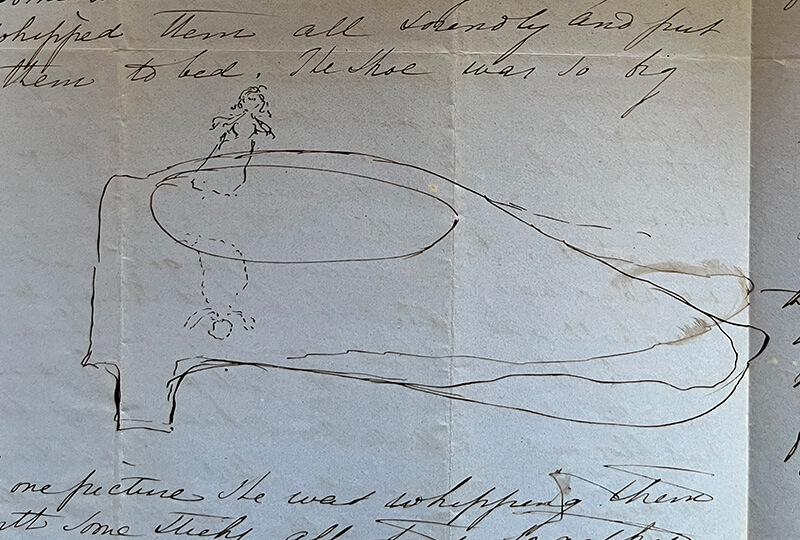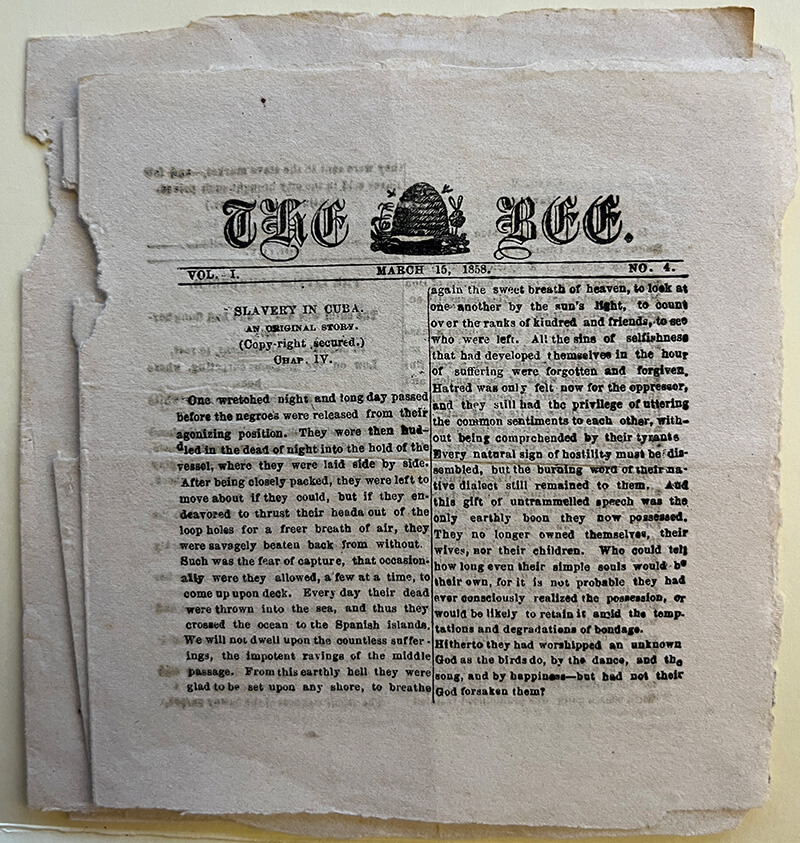Horace Mann spent his first Christmas as president of Antioch College on the road. Mary Mann describes the celebration in a letter to her father back in Boston. The week before she sent Dr. Peabody a letter from his grandsons Benjamin Pickman Mann and George Combe Mann, written in her hand, and they sound exactly like kids their age. Five year old Benjamin, who calls himself “Benjie Picky Manny” in the salutation, shares the wonders of Ohio produce with his grandfather and observes that the pigs of Yellow Springs run free, no doubt in stark contrast to Massachusetts. Local farmers would not be required to pen their pigs until the early 20th century. He relates that his brother ate a snowball and is goaded into throwing another at a window by Starry Mills, daughter of William Mills, though he does not relate whether this happened or not. Why village postmaster and soon to be College Trustee John Kerschner (one term, 1854-1858) broke Sam Hagerty’s arm, no one can say. Helen Morton of Plymouth, MA was enrolled for just one year. The tumblers she has are probably toy acrobats. Mary Downer, daughter of Boston merchant and friend to Horace Mann Samuel Downer, came from Dorchester, MA, and stayed until 1856. Benjie recites the rhyme of the old woman who lived in a shoe (reminding us just how awful Mother Goose can be in its original form) and illustrates it with an accompanying diagram. Antaeus the giant was one of the twelve labors of Hercules from Greek mythology. He closes with the telling statement “our house is not made.” Because the president’s house is still under construction, and will be for almost three more years, the Manns live in North Hall.
Seven (almost eight) year old George confirms he ate the snowball and looks forward to his new school, almost certainly the fanciful bygone structure known as Little Antioch, then under construction. He notes that the College still does not have all its windows installed even as winter closes in. Nor does it have its own water source, having to rely on the good graces of William Neff, owner of the land around the Yellow Spring. He nonetheless wants fountains installed on the campus (one is even depicted in one of the earliest published images of the College, though none were ever built). The cistern he references is likely the one discovered by John Feinberg (class of 1970) when he served as Master Planner for the reopened Antioch under Matthew Derr (class of 1989). It’s really hard to say what Ben means by the printed line at the end of the letter.

Photo: The schoolhouse built by William Mills known as “Little Antioch” was at the corner of Limestone Street and Xenia Ave.
Mary’s letter of the following week relates many travails, most involving keeping house. She seems to have no trouble with the job a servant named Rosa was doing; her trouble seems to be with Rosa herself, whom she has just let go. To put her “premises in Pimlico” is colloquial for “in good order” (thank you, old dictionaries in Olive Kettering Library) and possibly originates with an English resort of the same name from the Elizabethan era famous for its ale. The Cheneys she describes run a spa and hospital in what is now the South Glen of Glen Helen which employed the curative powers of water to cure peoples’ ailments. Her account of the price of eggs and milk says much about the cost of living in Ohio in the mid nineteenth century. The tank that provides fresh water to the campus community was in one of the towers of Main Building, and she makes that arrangement’s inadequacies abundantly clear. Jane Andrews of Newburybort, MA, was a student for just a year. Mary Jane Tallent, a teacher in the College’s Preparatory Department, also only stayed for one year. Calvin, her nephew and the brother of Rebecca Pennell, was a member of the first College Faculty; how Mary managed to frighten his class of Latin students is anybody’s guess.
As she describes what the kids received as Christmas presents, Mary mentions a printing press for George, likely a toy press. Among the treasures in Antiochiana is a small run of a tiny newspaper attributed to George Combe Mann called “The Bee,” which, at approximately four inches on a side, must have been printed on this press. “The Bee” is significant because it was the first publication to print any part of Mary Mann’s Cuba Journal, the source material for her 1887 novel Juanita: A Romance of Real Life in Cuba Fifty Years Ago. The journal itself is no work of fiction, being her observations of the slave economy of Cuba 1833-1835 while she accompanied her sister Sophia on a visit prescribed by her physician. The experience solidified Mary Mann’s abolitionism. Some speculate that she waited to publish the full manuscript for over fifty years in deference to the family who hosted her stay in Cuba while others see it as a timely commentary on the annexation of Cuba by the United States, a very hot topic in the 1880s.
**************************
Dec. 16 (1853). Benjamin P. Mann to Dr. Nathaniel Peabody.
(Written by Mrs. Mary Mann)
From Benjie Picky Manny
Dec. 18th
Dear Grandpapa,
Some day I am going to send you a present. I wish I could send you one of the great, big, bouncing Ohio apples. Some of them are yellow & red, some are very red, some are very yellow, some are green as grass. The walnuts of Ohio are as big as two of our walnuts in West Newton. The grass is as green as the leaves are on any tree in the world. I am going to tell you about pigs & hogs & sows. The pigs are digging holes in the ground so that when any one goes along they will fall in & get drowned. The pigs live out of doors. This is the very first day we have had any snow. George made a snowball and ate it. And Starry made a snowball & said come, let us break one of the windows in the college. The geranium has bloomed. Mrs. Kerschner gave the geranium to Mama. Mrs. Kerschner is the post master’s wife. The postmaster struck Sam Hagerty and broke his arm. Miss Morton has two little tumblers about two inches high. She has a beautiful brother’s picture, and another picture of two little sisters. Mary Downer sent home to Minna a box full of pictures of an old woman that lived in a shoe that had so many children she did not know what to do, so she gave them some broth without any bread, and whipped them all soundly and put them to bed. The shoe was so big.
In one picture she was whipping them with some sticks all tied together. In another picture each little child had a bowl of broth. In one picture the shoe had tumbled over & all the children were tumbling out, like the lower one Mama drew. I have a great bathing tub shaped like a hat. Antaeus sat on five thousand pigmies & crushed them all together. Our house is not made.
B.P. Mann

Illustration: “There Was An Old Woman Who Lived In A Shoe” by Mary Mann
From Georgie
Dear Grandpapa
I made a snowball & ate it up. They are building a new school house where I go to school. It is going to be the prettiest school-house in the State of Ohio. The carpenters are putting the windows into the college. There is a large cistern in front of the college twenty feet deep. Mr. Neff says we may have the water from his spring without paying for it. Papa is going to ask Mr. Merrifield to have some fountains made. They are putting the black board paper up in the south wing. Tomorrow will be a week from Christmas & two weeks from New Year’s.
George Combe Mann
(In Ben’s print:) B.P. Mann
Go down stairs go rit & off

Photo: George Combe Mann’s little newspaper printed on a toy press he got for Christmas in 1853.
Dec 27, 1853. Mrs. Mary Mann to Dr. Nathaniel Peabody. (RLS)
Dec. 27th 1853
Dear father,
I have been chasing after an hour in which to write to you for at least a week, but have not found it till this moment. I wrote you in my last that Rosa had left me – and I find it makes a good deal of difference in my time for letter writing. I can hire sewing, but I cannot hire letter writing. You must not think that her absence causes me any weariness. I am not the loser but the gainer by it, for I live now in peace & quietness, whereas she kept me in a perpetual state of excitement. It takes me about three hours to put my premises in Pimlico. I shall feel her loss bye & bye when the house is ready, but I need not feel in any haste about that, and hope to be supplied then. I still think I shall not try to have any one here, because the inconveniences come most heavily upon the girl, who must do my washing if she comes. The men bring wood into a great box in our hall, and the boys bring up water, & I housekeep much to my satisfaction, as I have no stairs to travel. Rose lives down stairs where she told some one she was President of the Wash-tub, and does all my washing among other people’s. We have hopes now of having our house in April, but it is a very uncertain country. Mr. Merrifield says he cannot as yet get any more workmen, and Mr. Merrifield is monarch of all he surveys. If you should happen upon any good woman who will come out here bye & bye, please let me know, but do not go one step out of your way to look for one, or engage one without first telling me. I hope to find some one here. The wife of Dr. Cheney, the proprietor of the water-cure establishment, called to see me today, & she says people frequently offer there, and she will keep me in mind. You ask the price of milk &c milk is five cents a quart! eggs twelve cents a dozen (they think this a great price here), chickens nine shillings a dozen, delivered at your door, but I cannot tell you the price of beef or pork. They are the only meats we ever see upon the commons’ table, except poultry about once in a month. We do not fare sumptuously. I keep a private skillet, in which I make corn starch blanc mange, and I bought some nice preserves at an auction here. I have a toasting fork, and I use my privilege of Presidentess to go to the bread or the butter-closet in the dining room, whenever I please – so if any one of our friends does not feel well, I officiate as hostess and nobody says me nay. If any one else is unwell, they do not fare very well, for the house-keeper is not just the person she ought to be, & has no sympathy for any one. Flour has been six dollars a barrel. It has risen since we came here. I do not know how much we shall pay for the children. Hitherto they have asked nine shillings board for the faculty, which has been resisted by some of the members. I do not know what they will conclude to charge us. We concluded to eat at the commons’ table for the good of the public, and it seems hardly fair to charge us an extra price. Mr. Dean, our agent, is travelling at the East on a collecting mission and is succeeding finely. I hope there will soon be money enough to finish up every thing. We suffer most for proper arrangements about water. We are living upon the loan of a spring, which Mr. Neff, our nabob neighbour, vouchsafes to the college at present, but as he is a man of caprices, there is no knowing when he may choose to cut us off. He might give us one of his springs, which are not of the least use to him, but which he holds on because they are his, with the most singular pertinacity. Meantime no water works are built, & we are all served out of a great tank which is filled every day by a man and a cart of barrels – and often freezes up solid.
Miss Andrews is doing beautifully here, spiritually speaking, but has a good deal of headache & chest-ache. She works very hard. Mary Jane Talent arrived last Monday, & has taken hold of the teaching vigorously. I heard two of Calvin’s classes recite Latin grammar this week – one which contained about forty men and a dozen young ladies. I believe I completely frightened the lesson out of them, for it is said they appeared less well that day than usual. Calvin was quite ill, but he is better again today.
On Saturday evening, which was Christmas eve, we had quite a frolic here. Rebecca and Mary Downer & I made a few presents to the children, & as Christmas was on Sunday we thought the excitement had better be over beforehand. So Rebecca dressed up Harry in muffs, tippets, & other wintry accourtements, surmounting the fabric by a large feather duster which had a very Indian look, & he scampered round among the children in the character of Santa Claus, scattering his gifts. Mr. Downer had consigned to Mary’s keeping a box for the occasion, containing a printing press for Georgie, a set of garden tools for, Benjie & a beautiful book for Horace – Benjie had also a book & an ivory top, and the boys a silver pencil case & other books. Some of the young ladies came down into their parlor to spend the evening, & were much entertained by the children. Georgie and Benjie wished to be dressed up also, so I fixed them up & they were quite satisfied with personating the character & making people laugh.
Today Georgie is eight years old, Dec. 27th. I do not mean it shall be so long before I write again. My husband has gone to Columbus to a State School Convention & then to Cleveland & home by the way of Pittsburgh, lecturing at each place. He expects to be gone a week.
Love to all. Good night, dear father.
Yr. aff. daughter Mary
